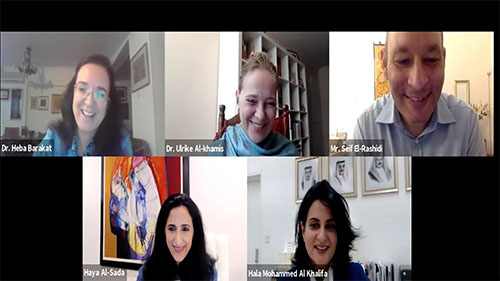Contact Center
.
28 November 2020
Bahrain Culture Authority’s Virtual Panel Discussion Exploring Islamic Arts’ Horizons, On the Occasion of International Day of Islamic Art event celebrations


As part of the International Day of Islamic Art event celebrations, Bahrain Authority for Culture and Antiquities, organized a virtual panel discussion, a webinar, via Zoom entitled “Global Perspectives on Islamic Art Today” hosted by Dr. Heba Barakat, Head Curatorial Affairs at the Islamic Arts Museum in Malaysia, Dr. Ulrike Al-Khamis, Interim Director of Aga Khan Museum in Canada, and Mr. Seif El-Rashidi, Director of the” Barakat Trust” in the United Kingdom.
The session discussed Islamic Art as a multifaceted style that is the accumulation of 1400 years of history and vast amazing geographical diversity.
At the beginning of webinar, Her Excellency Shaikha Hala bint Mohammed Al Khalifa, Director General of Culture and Arts at the Bahrain Authority for Culture and Antiquities, said: “ We celebrate today the Islamic Art that tells the story of a civilization deeply—rooted that had spread throughout the four corners of the world. We mark a day that has been adopted by UNESCO General Conference after Bahrain’s proposal in 2018, a year dedicated to celebrating Muharraq as the Capital of Islamic Culture”. H.E added to say: “Marking this day worldwide has been the dream of H.E Shaikha Mai Bint Mohammed Al-Khalifa, President of BACA that has finally come true and became a reality. It has now been recognized as the lighthouse guiding Islamic Art lovers, revisiting the most beautiful aspects and manifestations of Islamic civilization, reflected through arts that are so diversified and vivid to impact our daily lives in the present”.
H.E has also pointed out that the Islamic Art represents an inspiring force for youth today, as well as the traditional craft industries, arguing that this online symposium aims to enrich the discussion and dialogue centered on the diversified richness and beauty of the Islamic world, its arts and civilizations.
Dr. Ulrike Al-Khamis said during her intervention that the Islamic Art is now being defined in an academic methodology based mainly on its tangible material aspect, adding this multiple discipline and diversified art has intangible side that we should shed lights on. Al-Khamis has also pointed out that many Islamic art masterpieces have a deeply-rooted history because they were considered as crafts in the past and continue to be today also. Considering them simply as art pieces render much injustice to their creative beauty, Dr. Al-Khamis added. Dr. Ulrike said that the definition of the Islamic art among Muslim societies is not the same for others societies around the world. The rest of the world communities consider the tangible, spiritual and moral aspects of this art.
Speaking about the Aga Khan Museum Collection, Canada, Dr. Ulrike said that the museum seeks to promote co-existence and cultural exchange through its permanent and temporary exhibitions and its interactive policy with modern art tendencies. Dr. Ulrike rejoined saying that the Aga Khan Museum hosts 1200 various art pieces, some of which date back to the 7th century AD, exceptional magnificent art pieces made of glass, ceramics, metals etc.
Dr. Heba Barakat, for her part, said that our understanding of the Islamic should be much wider and broader in perspective, encompassing all its tangible and intangible elements, arguing that this art invites different interpretations and be can viewed from different angles according to the place and time of its creation. In addition, Dr. Barakat argued the Islamic Arts Museum in Malaysia, which is considered the biggest museum in the South-East Asia region, hosts the biggest art collection there and aims at the promotion of Islamic art throughout the whole world not simply in Asia. Dr. Barakat added to say that the Islamic Arts Museum in Malaysia hosts permanent and temporary exhibitions, intangible Islamic art halls, such as the famous traditional heritage dolls, arguing that the museum’s focus now is on modern Islamic art given its potential capacity to enhance the dialogue between cultures and civilizations.
Mr. Seif El-Rashidi, Director of the” Barakat Trust” in the United Kingdom said during the virtual panel discussion that the Barakat Trust was established in order to develop the skills of human resources working at the heritage and Islamic arts’ preservation and safeguard through scholarships, training programs, providing support and sponsorships to crafts’ projects. El-Rashidi argued that the Barakat Trust highlights the importance of education as a means of Islamic Art’s heritage preservation and safeguard, encouraging its conservation with a special focus nowadays on creative skills and traditional craft industries.
It is worth to mention that the Bahrain Authority for Culture and Antiquities celebrated the International Day of Islamic Art, on 25 November 2020, launching a series of first time ever scheduled events celebrating this deep-rooted art, which were held both at the Art Center and at Bahrain National Museum outdoor yards. The celebrations’ program also included a virtual panel discussion on Islamic art, the first time held ever since UNESCO General Conference adopted and approved the Kingdom of Bahrain’s proposal to celebrate Islamic Art Day on 18 November every year.







